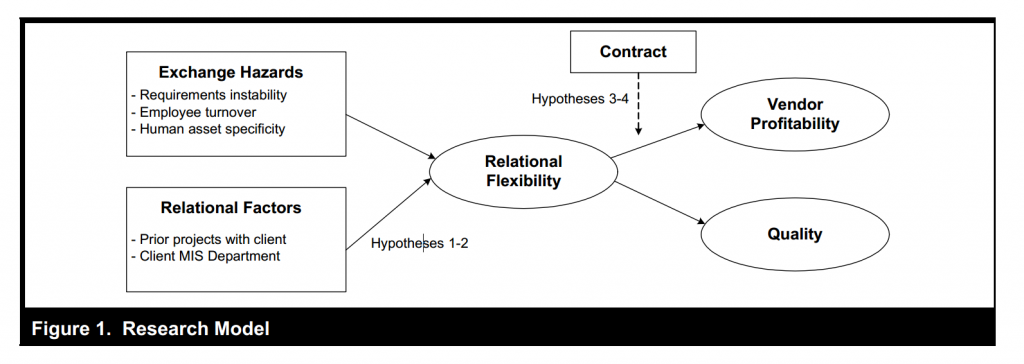Gopal and Koka 2012_ Yiran
The authors examine the interacting effect of formal contracts and relational governance on vendor profitability and quality in the software outsourcing industry. They focus on the presence of relations flexibility in the exchange relationship, a critical manifestation of relational governance. They hypothesize that 1.relational flexibility provides greater benefits to an exchange partner that faces the greater proportion of risk in a project, induced through the contract; 2. The benefits manifest on the performance dimensions that are of importance to the risk-exposed partner.
The proposed the following model to test their hypothesis. They proposed two sub model: the relational flexibility model and the profitability and quality model. To operationalize the focal variable relational flexibility, they measure it as an observed outcome that represents ex post, extra-contractual aspect of the relationship. They identify five areas, namely payment procedures, warranty and liability conditions, installation and testing procedures, disputes resolution and project management. In terms of the dependent variables, the project profit was measured using the data collected from the company data base for each project. The service quality is measured by a five-item survey.
The author used muli-pronged analytic strategy to test the hypotheses. To solve the problem of the endogenous interacting variables, besides the OLS and 3SLS, they also use the Treatment effect model. All the hypotheses are supported, showing evidence for the argument that asymmetric benefits from relational flexibility to different contracting parties in an outsourcing relationship. The results also indicates that relational flexibility positively affects profitability in only fixed price contracts, where the vendor faces greater risk, while positively affecting quality only in time and materials contracts, where the client is at greater risk.



Leave a Reply
You must be logged in to post a comment.